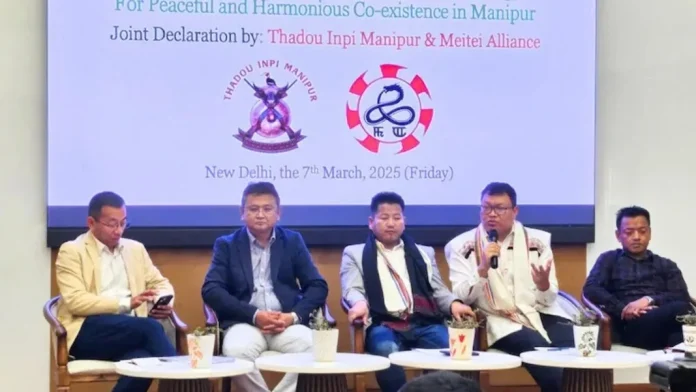GUWAHATI, May 3: In a rare display of consensus amid ongoing ethnic tensions in Manipur, civil society organisations representing the Thadou and Meitei communities have issued a joint statement reaffirming their commitment to the unity and territorial integrity of the state. This significant declaration stems from an academic forum held on April 10 at the India International Centre, New Delhi, titled “Ethnic Identity and Conflict in Manipur.”
The event was co-hosted by Thadou Inpi Manipur and the Thadou Students’ Association in partnership with Meitei Heritage Society, Delhi Manipuri Society, and the Ningol United Progressive Initiative. It brought together community leaders, scholars, and activists to facilitate dialogue on inter-ethnic understanding and cooperation.
The joint declaration reaffirmed the historic March 7, 2025, community understanding between the Thadou and Meitei groups, which had earlier laid the foundation for peaceful coexistence and collaborative resolution of inter-community issues in the wake of Manipur’s prolonged ethnic crisis.
A key highlight of the joint statement was the unified call for the Government of India to expedite the implementation of the National Register of Citizens (NRC) in Manipur. The organisations stressed that an updated NRC is essential for identifying illegal immigrants and safeguarding the demographic integrity of the indigenous population.
In a strong and controversial stance, the joint declaration also demanded the removal of the term “Any Kuki Tribes” (AKT) from the Scheduled Tribes (ST) list. The statement described the term as unconstitutional and ambiguous, alleging that it has been exploited by illegal immigrants to access benefits they do not deserve. It further claimed that the AKT category was politically inserted into the ST list in 2003 and has since enabled illegal settlements and what the statement refers to as “Kuki Supremacism,” allegedly undermining national security and the unity of Manipur.
The Thadou representatives clarified that their community is a distinct ethnic group and does not fall under the “Kuki” label. Both Meitei and Thadou organisations asserted that “Kuki” is a colonial-era construct now being leveraged by vested interests to push separatist agendas.
Furthermore, the joint statement accused Kuki militant groups and their affiliates of violating the Suspension of Operations (SoO) agreement. According to the statement, these groups have used the ceasefire as a cover to commit violence against unarmed civilians. It echoed a resolution passed by the Manipur Legislative Assembly, demanding that the Government of India revoke the SoO pact immediately.
The declaration also endorsed the Ministry of Home Affairs’ initiatives to ensure free and safe movement throughout the state, especially along the highways connecting the hills and valley regions. It urged the central government to prioritise the resettlement and rehabilitation of Internally Displaced Persons (IDPs), ensuring adequate compensation and long-term security for those affected by the conflict.
Both Thadou and Meitei organisations called on other civil society groups in Manipur to engage in mutual respect, constructive dialogue, and lasting peace rooted in justice, identity recognition, and coexistence.
The joint declaration marks a notable shift in Manipur’s inter-ethnic relations and could significantly influence both state and national policy in the context of ongoing demographic and political disputes.

